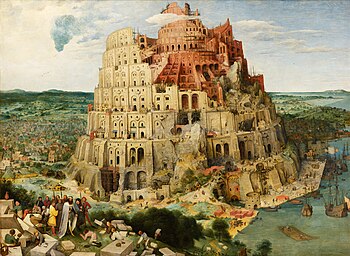 In my other blog (Writer's Wavelength), I referred to twitter and other social media as a new Tower of Babel. That got me thinking about the Biblical story behind that phrase. The story is in Genesis Chapter 11. The community of man, with one language, working together, builds a tall tower. "Come, let us build ourselves a city, with a tower that reaches to the heavens, so that we may make a name for ourselves and not be scattered over the face of the whole earth," they say. Then God sees it and says, "If as one people speaking the same language they have begun to do this, then nothing they plan to do will be impossible for them." So He decides to confuse their language and scatter them over the world.
In my other blog (Writer's Wavelength), I referred to twitter and other social media as a new Tower of Babel. That got me thinking about the Biblical story behind that phrase. The story is in Genesis Chapter 11. The community of man, with one language, working together, builds a tall tower. "Come, let us build ourselves a city, with a tower that reaches to the heavens, so that we may make a name for ourselves and not be scattered over the face of the whole earth," they say. Then God sees it and says, "If as one people speaking the same language they have begun to do this, then nothing they plan to do will be impossible for them." So He decides to confuse their language and scatter them over the world.The image of God here, as in so much of Genesis, is a little troubling. He seems spiteful, much like in Eden. "Uh-oh. They're getting too much like me. Can't have that!" Why not? If humanity is made in God's image, if God wants us to strive to be pure and good, to be like Him and therefore worthy, why not celebrate the way His children are reaching, the way they are working together towards a common goal? Worse, God seems to inherently mistrust his children, assuming that being able to accomplish whatever they put their minds to is automatically a bad thing. (Knowing human beings, God is right about this. If we could accomplish whatever we planned without struggle and effort, it might lead us down a very dangerous and destructive path.)
The story is often interpreted as a cautionary tale about hubris, much like Daedalus and Icarus in Greek mythology, who were punished for flying too near the sun. I think there's a subtle difference. The key is in the phrase "so that we may make a name for ourselves." The people building the tower aren't seeking divinity; they're seeking fame. They also seem to be seeking the common good of togetherness ("and not be scattered over the face of the whole earth"), but their primary aim appears to be getting noticed. Celebrity. Narcissism. Vanity. Perhaps this story calls upon us to examine every lofty human endeavor through this lens, questioning whether the motives are altruistic or narcissistic.
What's also interesting to me, though, is God's absolute certainty that, if human beings can easily communicate with one another and work together "as one people," then "nothing they plan will be impossible for them." There's something oddly hopeful in that, a kind of confidence. After all, God thinks we can literally accomplish anything we put our minds to if we work "as one people" with a common language. What a tremendous statement of the potential of human community!
The story attempts to answer the age-old question "Why can't we all just get along?" while at the same time acknowledging what incredible things we could do if ever we DID get along. Here on earth, maybe effortless cooperation and communication are no longer possible. Maybe, the struggle inherent in communicating with one another post-Babel is part of the learning process we must engage in on earth. Perhaps it makes us better people if we must work to understand one another. That process forces us to put others first, thereby limiting our inherent narcissism, our desire "to make a name for ourselves." Maybe striving for community and communication only has value when it comes not from a place of narcissism but merely for the common good. As St. Francis of Assisi put it, "grant that I may not so much seek to be consoled as to console, to be understood as to understand." Perhaps that is the true lesson of the Tower of Babel.
The story attempts to answer the age-old question "Why can't we all just get along?" while at the same time acknowledging what incredible things we could do if ever we DID get along. Here on earth, maybe effortless cooperation and communication are no longer possible. Maybe, the struggle inherent in communicating with one another post-Babel is part of the learning process we must engage in on earth. Perhaps it makes us better people if we must work to understand one another. That process forces us to put others first, thereby limiting our inherent narcissism, our desire "to make a name for ourselves." Maybe striving for community and communication only has value when it comes not from a place of narcissism but merely for the common good. As St. Francis of Assisi put it, "grant that I may not so much seek to be consoled as to console, to be understood as to understand." Perhaps that is the true lesson of the Tower of Babel.
No comments:
Post a Comment